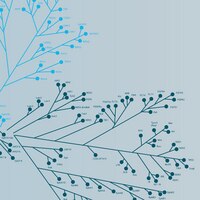Simian virus 40 small tumor antigen inhibits dephosphorylation of protein kinase A-phosphorylated CREB and regulates CREB transcriptional stimulation.
Wheat, W H, et al.
Mol. Cell. Biol., 14: 5881-90 (1994)
1993
Mostrar resumen
We report that the small tumor (small-t) antigen of simian virus 40 (SV40) forms complexes with nuclear protein phosphatase 2A (PP2A) and regulates the phosphorylation and transcriptional transactivation function of the cyclic AMP (cAMP)-regulatory element binding protein (CREB). PP2A coimmunoprecipitated with small t from nuclear extracts from HepG2 cells expressing small t or from rat liver nuclear extracts to which recombinant small t was added. Protein phosphatase 1 was not detected in small-t immunoprecipitates. In HepG2 cells expressing small t, dibutyryl-cAMP (Bt2cAMP) stimulated the phosphorylation of CREB 65-fold, whereas CREB phosphorylation was stimulated only 5- to 8-fold by Bt2cAMP in cells not expressing small t. Small t also inhibited the dephosphorylation of cAMP-dependent protein kinase (PKA)-phosphorylated CREB in rat liver nuclear extracts. In cells expressing small t, Bt2cAMP-stimulated transcription from the phosphoenolpyruvate carboxykinase (PEPCK) gene promoter was enhanced over the level of transcription from the PEPCK promoter in cells not expressing small t. Small t also enhanced Bt2cAMP-stimulated transcription from a Gal4-responsive promoter in cells expressing a chimeric protein containing the Gal4 DNA-binding domain linked to the CREB transactivation domain. However, small t did not stimulate transcription either from a 5' deletion mutant of the PEPCK promoter that is not able to bind CREB or from the Gal4-responsive promoter in the absence of the Gal4-CREB protein. These data suggest that small t enhances Bt2cAMP-stimulated gene transcription by inhibiting the dephosphorylation of PKA-phosphorylated CREB by nuclear PP2A. These findings support previous observations that nuclear PP2A is the primary phosphatase that dephosphorylates PKA-phosphorylated CREB. | Phosphatase Assay | 8065321
 |
The tumour promoter okadaic acid inhibits reticulocyte-lysate protein synthesis by increasing the net phosphorylation of elongation factor 2.
Redpath, N T and Proud, C G
Biochem. J., 262: 69-75 (1989)
1988
Mostrar resumen
Okadaic acid, a tumour promoter which potently inhibits protein phosphatases, inhibited translation in the reticulocyte-lysate cell-free system. Inhibition was dose-dependent, with half-maximal effects occurring at 20-40 nM-okadaic acid. Inhibition of translation by okadaic acid resulted in the accumulation of polyribosomes, indicating that it was due to a decrease in the rate of elongation relative to initiation. Okadaic acid (at concentrations which inhibited translation) caused increased phosphorylation of a number of proteins in the lysate. Prominent among these was a protein of Mr 100,000, which has previously been identified as elongation factor 2 (EF-2). EF-2 is a specific substrate for a Ca2+/calmodulin-dependent protein kinase, which phosphorylates EF-2 on threonine residues. The Mr-100,000 band was phosphorylated exclusively on threonine residues, and its degree of 32P labelling was decreased by the Ca2+ chelator EGTA and by the calmodulin antagonist trifluoperazine. These agents attenuated the effects of okadaic acid on EF-2 phosphorylation and translation. When ranges of concentrations of each agent were tested, their effects on EF-2 labelling correlated well with their ability to reverse the okadaic acid-induced inhibition of translation. These findings demonstrate that increased phosphorylation of EF-2 results in an impairment of peptide-chain elongation when natural mRNA is used. The possible physiological role of EF-2 phosphorylation in the control of translation is discussed. | | 2510715
 |
Effects of the tumour promoter okadaic acid on intracellular protein phosphorylation and metabolism.
Haystead, T A, et al.
Nature, 337: 78-81 (1989)
1988
Mostrar resumen
Okadaic acid is a polyether derivative of 38-carbon fatty acid, and is implicated as the causative agent of diarrhetic shellfish poisoning. It is a potent tumour promoter that is not an activator of protein kinase C, but is a powerful inhibitor of protein phosphatases-1 and -2A (PP1 and PP2A) in vitro. We report here that okadaic acid rapidly stimulates protein phosphorylation in intact cells, and behaves like a specific protein phosphatase inhibitor in a variety of metabolic processes. Our results indicate that PP1 and PP2A are the dominant protein phosphatases acting on a wide range of phosphoproteins in vivo. We also find that okadaic acid mimics the effect of insulin on glucose transport in adipocytes, which suggests that this process is stimulated by a serine/threonine phosphorylation event. | | 2562908
 |
Okadaic acid. Protein phosphatase inhibition and muscle contractile effects.
Takai, A
J. Muscle Res. Cell. Motil., 9: 563-5 (1988)
1987
Mostrar resumen
Okadaic acid (OA;C44H66O13) is a polyether derivative of a C38 fatty acid first isolated from marine sponges of the genus Halichondria . It is thought to be synthesized by marine diflagellates and to accumulate in the other marine organisms such as sponges and shellfishes which feed on them. Physiologically, OA has been known to have a marked contractile effect on smooth muscles and heart muscle. Recent results strongly suggest that these contractile effects are due to the inhibitory action of OA on the intracellular protein phosphatase activity. | | 2850299
 |














